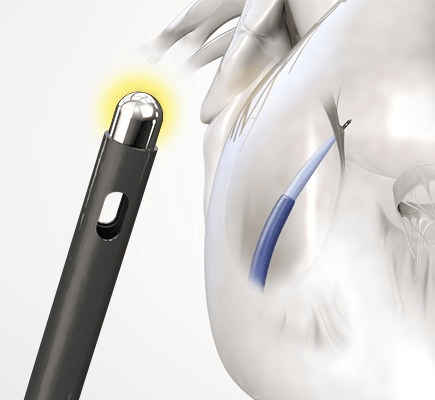A cost-effectiveness analysis completed by the University of California, San Francisco (UCSF) and Baylis Medical has shown that use of Baylis' RF transseptal needle results in cost savings per procedure, compared to use of a mechanical transseptal needle.

Image: Baylis Medical radiofrequency NRG transseptal needle. Photo: courtesy of CNW Group / Baylis Medical.
The study, entitled A Cost-Effectiveness Analysis Comparing the Baylis RF Needle to the Conventional Brockenbrough Needle for Transseptal Punctures, was presented at the Poster Session of the 2019 Heart Rhythm Society (HRS) Scientific Sessions
Transseptal access is a critical step in the minimally-invasive delivery of therapies for left-heart conditions, such as atrial fibrillation ablations, left atrial appendage closures and mitral valve repair.
The NRG Transseptal Needle, which uses radiofrequency energy to achieve a transseptal puncture rather than mechanical force, is recognized as the standard for left-heart access. It is widely used by physicians given its clinical advantages, such as improved crossing success rates123 and reduced procedure time123.
According to the study, despite higher initial investment of the NRG needle, the total cost at 30 days post-procedure was lower when the NRG needle was used than when using a mechanical needle, when accounting for procedural and complication costs.
“The results of our cost-effectiveness analysis are very positive. It is very interesting that the procedural- and complication-associated costs after 30 days are less than with the conventional mechanical needle. Some practicing electrophysiologists may be dissuaded by the initial upfront cost of the Baylis RF needle, and our results are likely to have a significant impact on the practice patterns of proceduralists who perform transseptal punctures,” said Dr. Jose Sanchez on behalf of the UCSF research team.
“While the clinical advantages of the RF needle are long-established, we are pleased to see the cost effectiveness confirmed in this analysis,” said Meghal Khakhar, Vice President of Regulatory and Scientific Affairs at Baylis Medical. “Baylis is proud to offer a clinical solution which reduces the rate of serious complications1,4 to the patient, while offering procedural savings to the healthcare system.”
Source: Company Press Release
